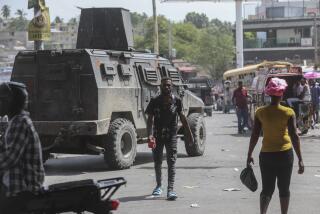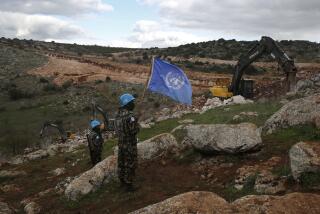Daring U.N. Raid Frees Sierra Leone Peacekeepers
- Share via
UNITED NATIONS — Heavily armed United Nations troops supported by helicopter gunships launched a rescue mission in the West African nation of Sierra Leone on Saturday to extract 233 of its peacekeepers who have spent two months at a base surrounded by rebel soldiers.
Secretary-General Kofi Annan indicated that the operation was successful in its initial stage and that it was continuing through difficult terrain controlled by hostile members of the Revolutionary United Front, or RUF.
Annan said 11 U.N. military observers and 29 of the soldiers who were too sick to travel by road were flown to safety in Freetown by helicopter.
Other gunships provided support for the attack on the rebel stronghold of Kailahun in the eastern part of the country about 200 miles from Freetown, the capital.
Some reports from U.N. personnel in the field said the rebels had suffered “serious casualties.” The operation involved as many as 1,000 U.N. troops.
“The use of force in a U.N. mission to extract its personnel from the area had become inevitable,” Annan said in a statement. He expressed hope that further violence could be avoided.
The secretary-general and U.N. officials in Sierra Leone indicated that the situation remained dicey.
“The United Nations forces have yet to cover some distance,” Annan said, warning the rebels “not to oppose this legitimate effort.”
He said the decision to attempt the rescue came only after “intensive diplomatic and political efforts at all levels” had failed and after attempts to send supplies to the beleaguered peacekeepers became impossible because of the rebels’ “increasing threatening posture” and the deteriorating conditions in the area.
At nightfall, the fate of freed U.N. peacekeepers who had fled the base by road remained unclear. The group, which was traveling down a muddy, winding road through thick rain forests, later joined a convoy of armored personnel carriers headed for Daru, the nearest town controlled by the U.N.
Officials at the world organization’s headquarters alongside the East River in Manhattan, N.Y., and personnel on the ground in Africa tried to monitor the convoy’s progress.
“The situation is still fluid,” a U.N. military spokesman told a news conference in Sierra Leone.
The rescue attempt began shortly after dawn when U.N. helicopters touched down and quickly picked up some of the peacekeepers. There were reports of the rebels firing at the helicopters.
In a coordinated action, the U.N. soldiers seeking to reach Daru broke out of the base.
Heavy gunfire erupted between the rebels and peacekeepers trying to reach safety. Two U.N. soldiers from India were reported wounded.
U.N. officials said troops from Ghana, Nigeria and India participated in the rescue attempt.
In London, Defense Secretary Geoff Hoon reported that British Chinook helicopters airlifted some peacekeepers to Freetown.
“I welcome this decisive action by UNAMSIL [the U.N. peacekeeping force], which demonstrates its clear resolve to operate where it needs in order to meet its mandate in Sierra Leone,” Hoon said.
The peacekeepers, who were confined to the small base, managed to keep their weapons. But U.N. officials said the already dangerous situation for the contingent of Indian peacekeepers continued to deteriorate because of torrential rain and the rebels’ refusal to allow resupply by convoy or by air.
After the troops, who were running low on food and medicines, sent a distress signal, the decision was made to attempt the rescue.
The U.N.’s mission in Sierra Leone has faced a series of crises. In May, the rebels took more than 500 U.N. peacekeepers hostage. After mediation by Liberian President Charles Taylor, the U.N. personnel eventually were released.
The 222 Indian peacekeepers and 11 observers were trapped later by the rebels, who have scuttled several peace accords. One deal last year that fell through brought warring factions--including the rebels--into a power-sharing government.
Over the years, the RUF rebels, headed by Foday Sankoh, have killed and maimed tens of thousands of people in an attempt to gain power during one of Africa’s most brutal civil wars. They gained notoriety for chopping off the hands, legs, ears and lips of men, women and children.
Sankoh, who is in government custody in Freetown, could face trial by an international court of justice for acts committed by his forces.
More to Read
Sign up for Essential California
The most important California stories and recommendations in your inbox every morning.
You may occasionally receive promotional content from the Los Angeles Times.













